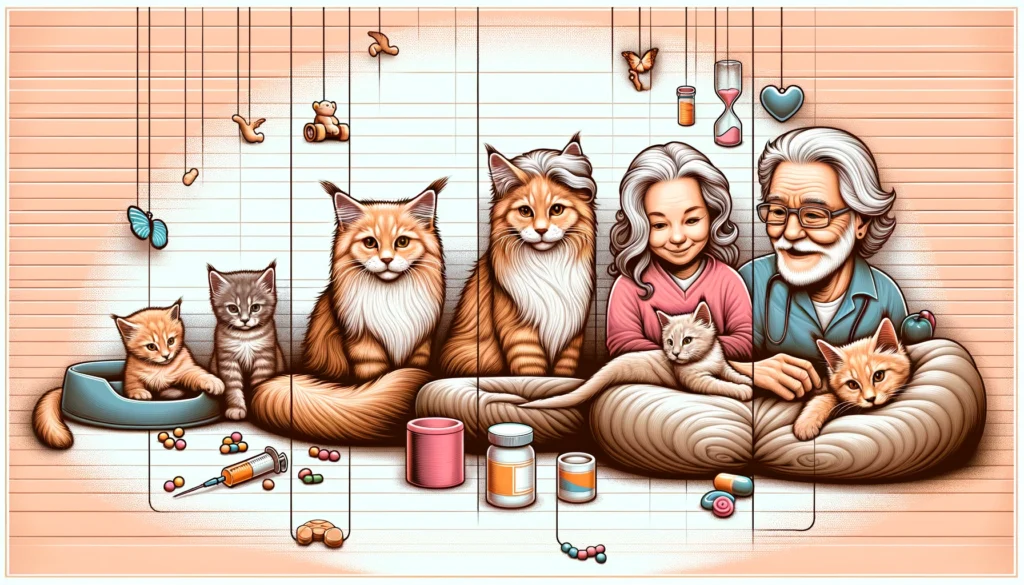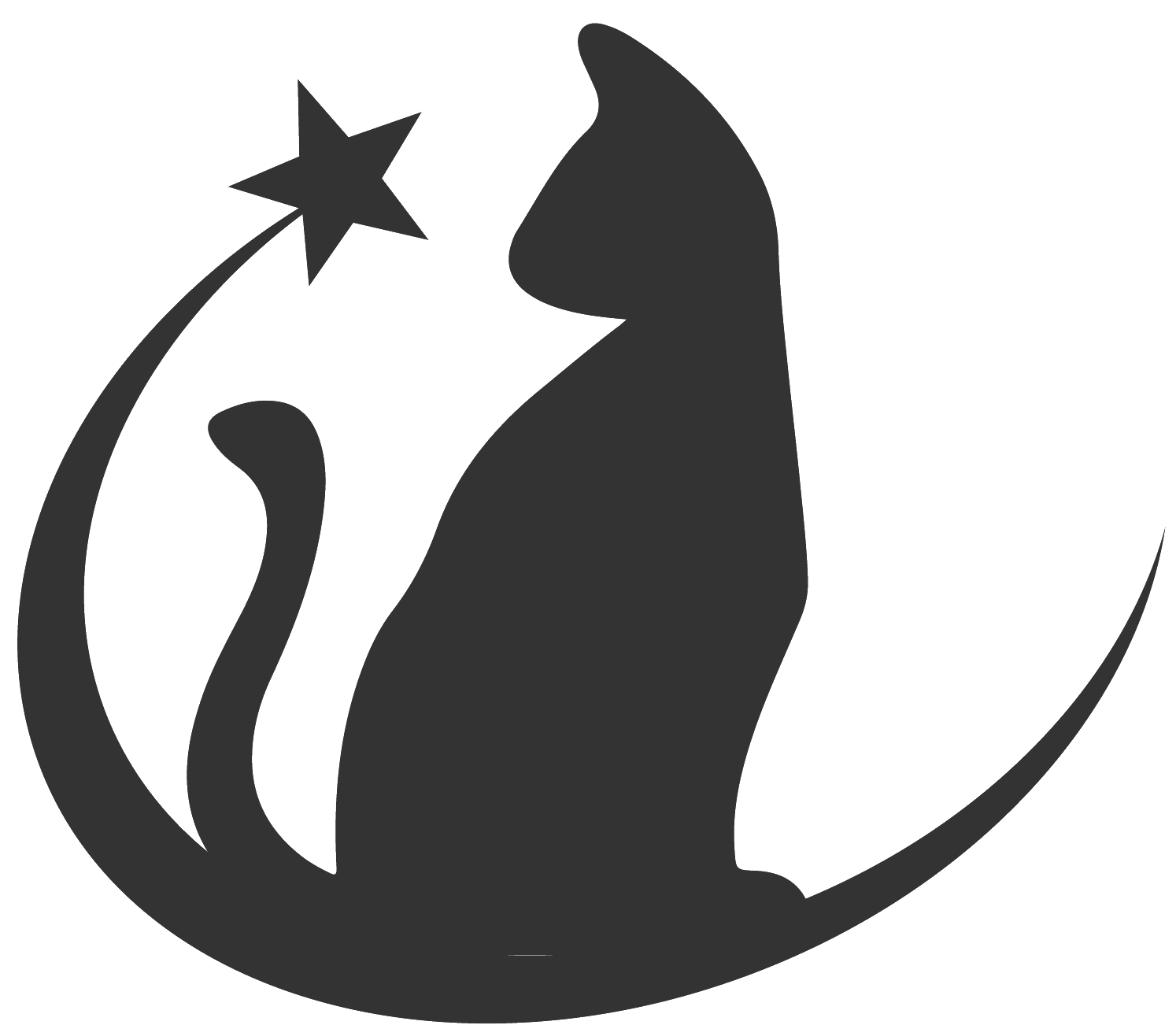
Maine Coon cats, known for their majestic appearance and affectionate personalities, require dedicated care throughout their lives. Whether you’re raising a playful kitten or nurturing a senior feline, understanding their unique needs at each life stage is essential. This comprehensive guide will walk you through lifelong care for Maine Coon cats, covering everything from their early days as kittens to their golden years as seniors.
Kittenhood Care
Selecting the Right Kitten
Choosing a Maine Coon kitten involves more than just picking the cutest one in the litter. Look for a reputable breeder who prioritizes health and temperament. Ensure the kitten has been socialized and is free from common genetic disorders.
Nutrition for Kittens
Nutrition is crucial for a growing Maine Coon. Opt for high-quality kitten food rich in protein and essential nutrients. Feed your kitten multiple small meals throughout the day to support their rapid growth and energy needs.
First Vet Visits
Early veterinary care is essential for your kitten’s health. Schedule vaccinations, deworming, and an initial health check-up to ensure your Maine Coon kitten starts life strong and healthy.
Socialization and Training
Introducing to the Home
When bringing your Maine Coon kitten home, create a quiet, safe space for them to adjust. Gradually introduce them to other pets and family members to prevent overwhelming them.
Basic Training Tips
Start with simple commands and use positive reinforcement techniques. Maine Coons are intelligent and can learn tricks and commands with patience and consistency.
Creating a Safe Environment
Cat-Proofing Your Home
Kittens are curious and mischievous. Cat-proof your home by securing loose wires, removing toxic plants, and ensuring windows and balconies are safely secured.
Safe Toys and Scratching Posts
Provide plenty of safe toys and scratching posts to keep your kitten entertained and prevent destructive behavior. Maine Coons love interactive toys that stimulate their hunting instincts.
Nutrition for Growth
Choosing Quality Food
Select a high-quality, protein-rich diet tailored for kittens. Avoid fillers and artificial additives that can affect their growth and health.
Feeding Schedules
Establish a consistent feeding schedule. Young kittens need frequent meals, which can gradually be reduced as they grow older.
Health Monitoring
Vaccinations
Ensure your kitten receives all necessary vaccinations to protect them from common feline diseases. Regular vet visits will help monitor their health and development.
Common Health Issues in Kittens
Be aware of potential health issues such as respiratory infections and parasites. Early detection and treatment are vital for a healthy start.
Adolescent Maine Coons
Dietary Changes
As your kitten matures, their dietary needs will change. Transition to high-quality adult cat food, gradually mixing it with their kitten food to avoid digestive issues.
Behavior Adjustments
Adolescence can bring changes in behavior. Be patient and consistent with training to guide your Maine Coon through this phase.
Exercise and Play
Importance of Physical Activity
Maine Coons are active cats that require regular exercise. Engage them in interactive play sessions to keep them physically and mentally stimulated.
Best Toys for Maine Coons
Choose toys that cater to their size and strength. Feather wands, laser pointers, and puzzle toys are excellent choices for keeping them engaged.
Grooming Essentials
Fur Care
Maine Coons have a thick, luxurious coat that requires regular grooming to prevent mats and tangles. Brush them several times a week, especially during shedding seasons.
Nail Trimming
Regular nail trimming is essential to prevent overgrowth and related issues. Use a cat-specific nail clipper and be gentle to avoid stressing your cat.
Dental Hygiene
Dental care is often overlooked but crucial. Brush your cat’s teeth regularly with a cat-safe toothpaste to prevent dental diseases.
Transition to Adulthood
Diet Adjustments
As your Maine Coon transitions to adulthood, adjust their diet to meet their changing nutritional needs. High-protein, balanced diets are essential for maintaining their health.
Health Check-Ups
Continue with regular veterinary visits to monitor their health. Annual check-ups can help catch any potential issues early.
Behavioral Changes
Understanding Adult Cat Behavior
Adult Maine Coons may exhibit more independence compared to their kitten years. Understanding their behavior can help strengthen your bond.
Addressing Issues
Address any behavioral issues promptly. Maine Coons are known for their friendly nature, but they may develop habits that need correcting.
Health and Wellness
Routine Vet Visits
Regular vet visits are crucial for maintaining your Maine Coon’s health. Annual exams, vaccinations, and dental check-ups are essential components of lifelong care.
Preventative Care
Implement preventative measures such as flea and tick control, regular grooming, and dental hygiene to ensure your Maine Coon stays healthy.
Maine Coon Adult Nutrition
Nutritional Needs
Adult Maine Coons require a diet rich in protein and essential nutrients. High-quality commercial cat food formulated for large breeds is recommended.
Best Food Choices
Choose cat food that lists meat as the first ingredient. Avoid foods with fillers, artificial colors, and preservatives.
Weight Management
Avoiding Obesity
Maine Coons are prone to obesity, which can lead to various health issues. Monitor their weight and adjust their diet and exercise routine as needed.
Healthy Weight Maintenance
Regular play sessions and a balanced diet are key to maintaining a healthy weight. Consult your vet for personalized advice.
Dental Care
Importance of Dental Hygiene
Dental health is critical for your Maine Coon’s overall well-being. Poor dental hygiene can lead to serious health issues.
Preventative Measures
Brush your cat’s teeth regularly and provide dental treats to help maintain their oral health.
Common Adult Health Issues
Recognizing Symptoms
Be aware of common health issues such as dental disease, obesity, and heart conditions. Early detection can make a significant difference in treatment outcomes.
When to See a Vet
Consult your vet if you notice any changes in behavior, appetite, or physical condition. Regular check-ups help catch issues early.
Senior Maine Coons
Signs of Aging
As Maine Coons age, they may show signs of slowing down, such as decreased activity and changes in behavior. Regular vet visits become even more crucial.
Special Care Requirements
Senior cats require special attention to their diet, mobility, and overall health. Adjustments in care can help them age gracefully.
Adjusting Diet for Seniors
Nutritional Needs of Older Cats
Older Maine Coons need a diet that supports joint health and overall wellness. Look for senior-specific cat food with added nutrients.
Supplements
Consider supplements such as glucosamine for joint health and omega-3 fatty acids for a healthy coat and skin.
Health Concerns in Senior Cats
Arthritis
Arthritis is common in senior cats. Provide soft bedding and consider joint supplements to ease their discomfort.
Kidney Disease
Monitor for signs of kidney disease, such as increased thirst and urination. Early detection and dietary management are vital.
Heart Health
Heart disease can affect older Maine Coons. Regular vet visits and a heart-healthy diet can help manage their condition.
Creating Comfort for Senior Cats
Comfortable Living Spaces
Provide cozy, accessible spaces for your senior cat. Soft bedding and easy-to-reach resting spots can enhance their comfort.
Accessibility
Ensure their food, water, and litter box are easily accessible. Avoid requiring them to climb stairs or jump to reach essential items.
Mental Stimulation
Keeping Senior Cats Engaged
Mental stimulation is important for senior cats to keep their minds sharp. Interactive toys and gentle play can help.
Interactive Toys
Choose toys that are easy for them to use. Puzzle feeders and gentle play activities can keep them entertained.
End-of-Life Care
Recognizing Quality of Life
As your Maine Coon approaches the end of their life, focus on their quality of life. Consult with your vet to ensure they remain comfortable and pain-free.
Making Difficult Decisions
Making end-of-life decisions is never easy. Seek support from your vet and consider your cat’s comfort and dignity.
Lifelong Care for Maine Coon Cats
Maine Coon cats are unique and require dedicated care throughout their lives. From playful kittens to dignified seniors, understanding their needs at each life stage ensures they live happy and healthy lives. By providing proper nutrition, regular vet care, and a loving environment, you can enjoy many wonderful years with your Maine Coon companion.
FAQs
What are the best foods for Maine Coon kittens?
High-quality kitten food rich in protein and essential nutrients is ideal for Maine Coon kittens. Brands like Royal Canin and Hill’s Science Diet offer excellent options.
How often should I groom my Maine Coon?
Maine Coons should be brushed several times a week to prevent mats and tangles. Regular grooming helps maintain their thick, luxurious coat.
What health issues are common in Maine Coons?
Common health issues in Maine Coons include hypertrophic cardiomyopathy (heart disease), hip dysplasia, and dental disease. Regular vet check-ups are crucial for early detection and management.
How can I keep my Maine Coon entertained?
Maine Coons are playful and intelligent. Interactive toys, puzzle feeders, and regular play sessions keep them mentally and physically stimulated.
What should I feed my senior Maine Coon?
Senior Maine Coons benefit from a diet tailored to their age, with added nutrients for joint health and overall wellness. Look for senior-specific cat food with high-quality ingredients.
When should I take my Maine Coon to the vet?
Regular vet visits are essential. Kittens need frequent visits for vaccinations, while adults should have annual check-ups. Senior cats may require more frequent visits to monitor their health.
Sources:
